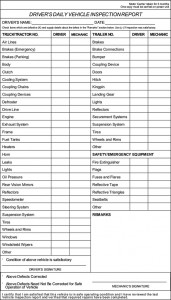In trucking, “out-of-service” criteria define a set of physical conditions under which a commercial motor vehicle (CMV) or commercial driver may be prohibited from operating. An out-of-service violation removes the driver and CMV from the roadway until the violation is corrected, which obviously means no work gets done and no one gets paid. In addition, out of service violations are sometimes punishable by fines.
The Federal Motor Carrier Safety Administration is serious about getting unsafe trucks off our roads and penalizing drivers and owners who fail to follow the regulations. In recent years, there have been more trucking companies and passenger bus companies placed out of service than ever before. The MAP-21 highway funding law that went into effect doubled most fines for serious violations.
Sharing the Blame
New rules that went into effect Oct. 1, 2013, allows the agency to place an entire carrier out of service for operating vehicles “without or beyond the scope of registration,” according to the regulation, whereas previously only the unregistered vehicle itself could be placed out of service. Now both the carrier as well as the vehicle can be penalized. Carriers and drivers who fail to comply with the state and federal regulations can be more easily be prevented from operating.
You can imagine this puts an even greater emphasis on thorough vehicle inspections and preventive maintenance which would catch potential risks to safety before they can cause accidents. A diligently-performed daily vehicle inspection will disclose such potential problems as faulty brake systems and bald tires.
Out-of-service penalties can also be levied against drivers without proper licensing and training. A CMV driver without a CDL or one that has expired can be just a serious a safety liability as brakes that won’t hold or tires ready to blow.
Activity in the Eagle Ford Shale in South Texas has increased truck traffic tremendously and statistics show trucking related accidents are up 41 percent.
Keep Eagle Ford Roadways Safe
[ic-l]In November, 2013, Sergeant Villarreal with Corpus Christi Department of Public Safety (DPS) spoke at the National Association for Publicly Funded Schools Region 4 “Keeping Our Roadways Safe” Conference at Del Mar College in Corpus Christi. Sergeant Villarreal indicated that the top three violations DPS officers see when pulling a commercial vehicle over in the Eagle Ford Shale are:
- Vehicle Inspections performed improperly or not at all
- Log Book Violations
- Driving a truck without a valid CDL license.
Keep Eagle Ford Drivers Trucking
Now that carriers as well as vehicles can be put out of service, here are five tips to help keep drivers “in service” and safely on the road:
- Repair broken equipment.
- Hire qualified drivers that have been properly trained with a valid CDL.
- Have a strict pre/post trip vehicle inspection policy and hold drivers responsible for conducting and reporting them.
- Have a no tolerance policy on faulty log book violations.
- Conduct weekly or monthly safety meetings and reward employees for good audit results and discipline drivers that do not.

